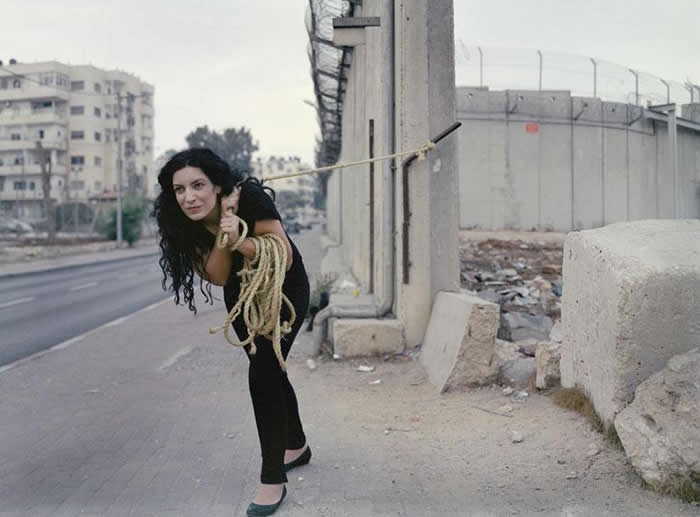Politics and the Production of Space
The exhibition Written City at the Bruges Cultural Centre, Belgium, looks at the spatial organization of the city and the state as a product of often conflicting political intentions. The exhibition analyzes the relationships between several political discourses and their design, interpretation and control of the urban and national space.
The development of urban and national space often presupposes forms of physical or symbolic inclusion and exclusion as we can watch it in the Middle East in our times. In that respect the exhibition deals with a number of spatial metaphors such as barricades, boundaries and fences or so-called “gated communities,” and at the same time the destruction or penetration of these types of partition.

How do politics and urban areas influence eachother? This is the question arousen by this exhibition.
More than twenty mainly international artists are approximating this issue displaying works by Greek tradgedy writers, propaganda posters for various regimes, video installations and other modern works of art and literature. The Written City – curated by Michel Dewilde and Lutz Becker – intends to identify the similarities between different political convictions.
The list of the participating artists forms a strong connection to a region in which political decisions and urbanisation are complicated and unstable. Amongst others are two artists from Palestine – Raeda Saadeh and Hazem Harb – who are dealing with the Israeli-Palestinian conflict with a particular reference to architecture of violence.
 Raeda Saadeh, Moving
Raeda Saadeh, Moving
The Israeli Separation Wall, snaking alongside and within the West Bank border, presents layers of friction, both physical and symbolic. The wall has become the structure that solidifies the entrapment, oppression, control, surveillance, ongoing land grab and physical dominance that the Israelis have placed onto Palestinians. The Wall has been an eternal source of frustration and many artists, writers and politicians have come to voice their aversion and anger towards it. The discussion on the wall, which began before the laying of the first brick more than ten years ago, has become a global one; it is not only Palestinians and Israelis who have voiced reactions, but artists, documentarians and writers from around the world.
The work of Raeda Saadeh comments on the interplay between women and politics, issues that are important for Saadeh in her daily life in Palestine and that run throughout her work. For Saadeh, woman is tied to the reality of her place and time, and aspires to another and better world.
Her life in Jerusalem is one of several states of occupation and contradiction: a concrete wall, fences, checkpoints, curfews, stone barriers and also a home, a language and cultural and social expectations. She is a Palestinian with an Israeli passport, and also an artist and therefore an unconventional, even rebellious woman living in a traditional Middle Eastern society.
She is immobilised physically – through the political obstructions to daily life imposed by the Israeli occupation – and domestically and socially – by the cultural expectations of women in a traditional Middle Eastern society.
Having spent his childhood and teenage years growing up in the contested grounds of Gaza, Palestinian artist Hazem Harb’s artistic output serves as an apolitical, first hand account of this on-going conflict. In his works he deals with a number of core issues including war, loss, trauma, human vulnerability and global instability affected by the situation in the Occupied Territories of Palestine.
 Hazem Harb, Everything Is Nonpermanent
Hazem Harb, Everything Is Nonpermanent
Curators: Michel Dewilde and Lutz Becker
This exhibition is part of the 2015 Bruges Triennial of Contemporary Art and Architecture.
Selected artists:
Ayman Baalbaki, Lutz Becker, Joseph Beuys, Ali Cherri, Tom Dale, Wim Delvoye, Rana Hamadeh, Lawrence Abu Hamdan, Hazem Harb, Loek Grootjans, Société Réaliste, Ragip Basmazölmez, Dominic MC Gill, Emilio Lopez-Menchero, Nils Norman, Amina Menia, Marjetica Potrč, Stefano Lupitani, William Pope L., Wesley Meuris, Mir-Hossein Mousavi, Vladimir Tatlin, Raeda Saadeh, Tala Vahabzadeh and Walid Siti.
19 April–21 June 2015
Organizer: Bruges Cultural Centre
Halles, Markt 3
8000 Bruges
Belgium

